




The College of Social and Behavioral Sciences, Community Classroom presented a total of 10 classes: 4 lecture classes and 6 masterclasses.
Online lecture classes highlighted the diversity of the southwest and reflected the rich culture of the Tucson community.
ROAMING THE SOUTHWEST : NATURAL AND CULTURAL LANDMARKS OF THE SONORAN REGION
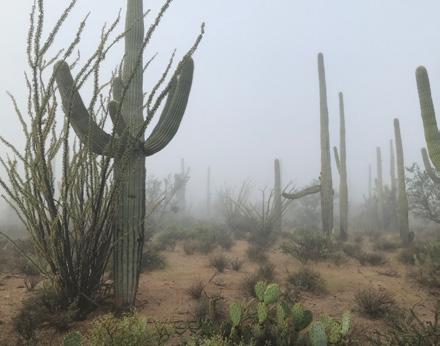
David Yetman
THE HISTORY OF THE BICYCLE

David Ortiz
Noam Chomsky & Marv Waterstone

Tyina Steptoe

In-person, cultural immersion masterclasses focused on food, culture and sustainability.

COFFEE: FROM CROP TO CUP

Burc Maruflu
XINACHTLI ~ ANCESTRAL COOKING AND STORYTELLING

Maria del Carmen Parra Cano
IT STARTS WITH A SEED: AN INTRODUCTION TO TOHONO O'ODHAM FARMING
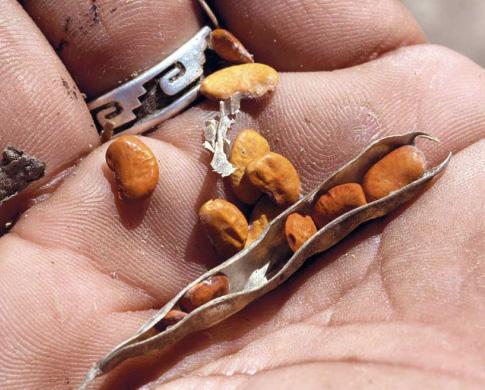
Raymond Antone
TUCSON: HOW A DESERT CITY BECAME LEADER IN GREEN INFRASTRUCTURE

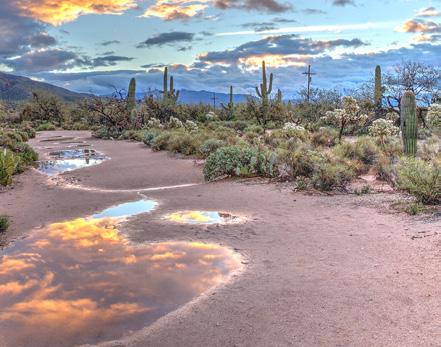
Adriana Zuniga
ADOBE OVEN DESIGN AND CONSTRUCTION
Pennelys Droz
INDUSTRIAL HEMP FOR HEALTHY HOMES
Micaela Machado
WHEN ASKED WHY STUDENTS WERE INTERESTED IN THEIR PROSPECTIVE CLASS:
• Topic was of interest
• Lifelong Learning
• Interested in local history
• Locally relevant
• Building hands-on skills
• Have previously met the instructor and were interested in learning more from them
WHO IS TAKING COMMUNITY CLASSROOM CLASSES?
• General Community
• Volunteers (Sustainable Tucson)
• Non profit Employees (Tohono Chul Gardens, Community Foodbank of SA, Primavera Foundation)
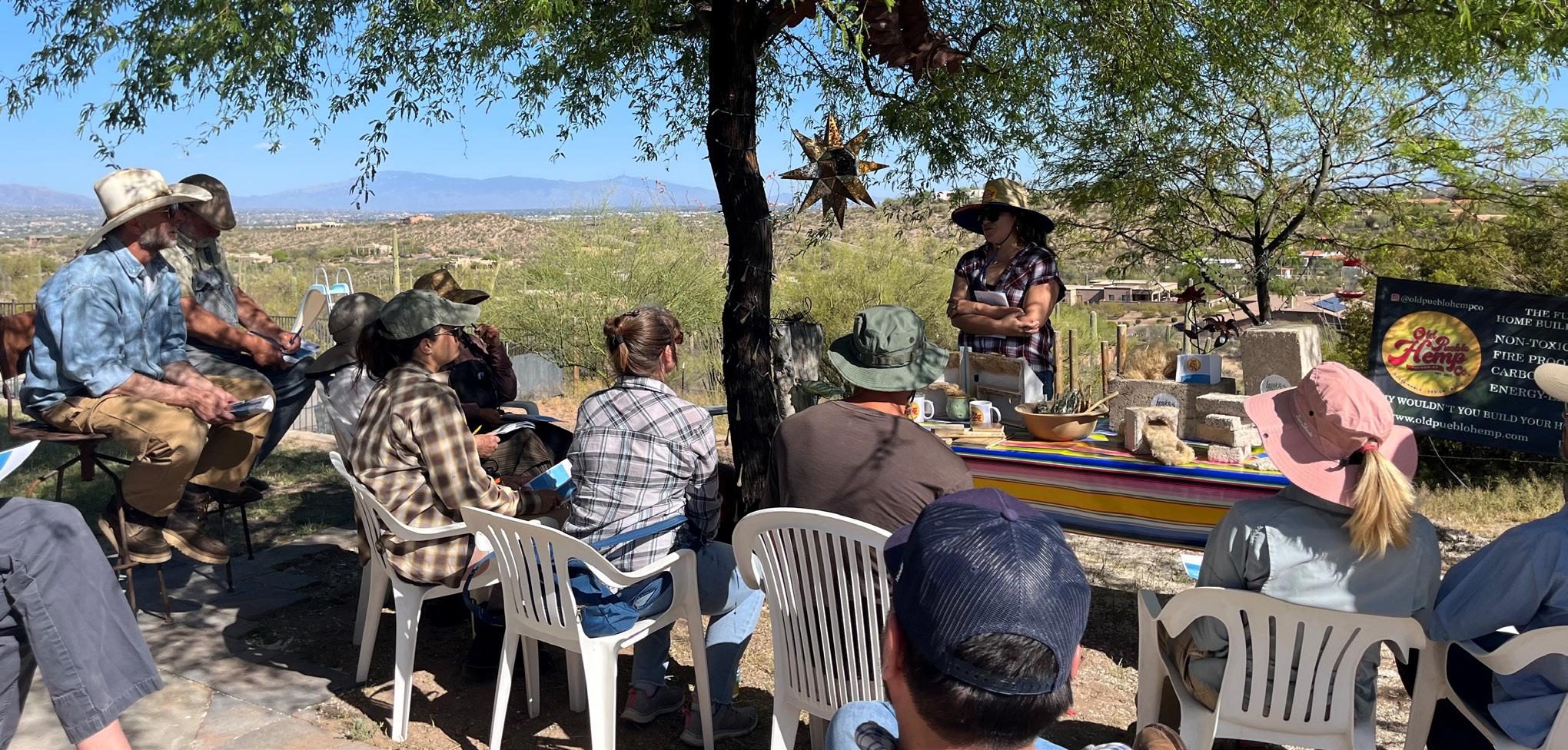
• Since Tucson has a robust cycling community, The History of the Bicycle class partnered with a local coalition to host a community bicycle advocacy ride.
Coffee: From Crop to Cup: "Nicely presented by Prof. Maruflu and his colleagues, dividing the topic in an interesting way. Of course, the coffee was a superb addition!"
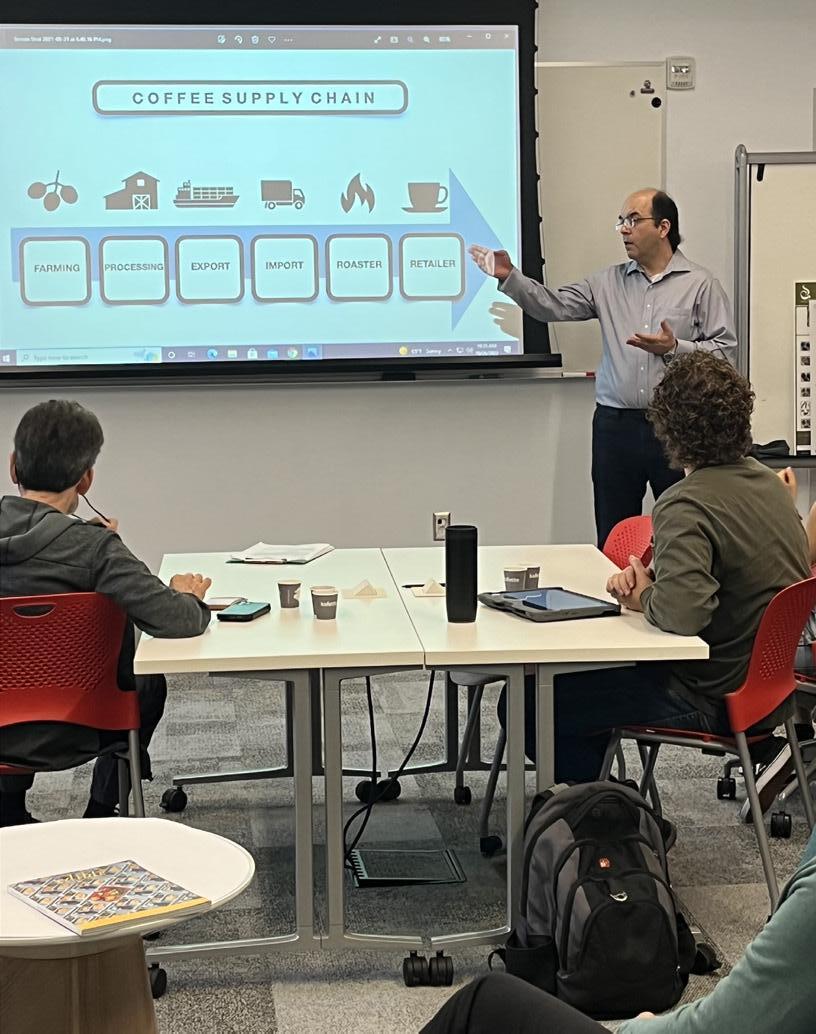
Adobe Oven Design & Construction: “I was interested in natural building so I liked how the topic was locally relevant and also offered real-life hands-on skills that I could use in my one life.”
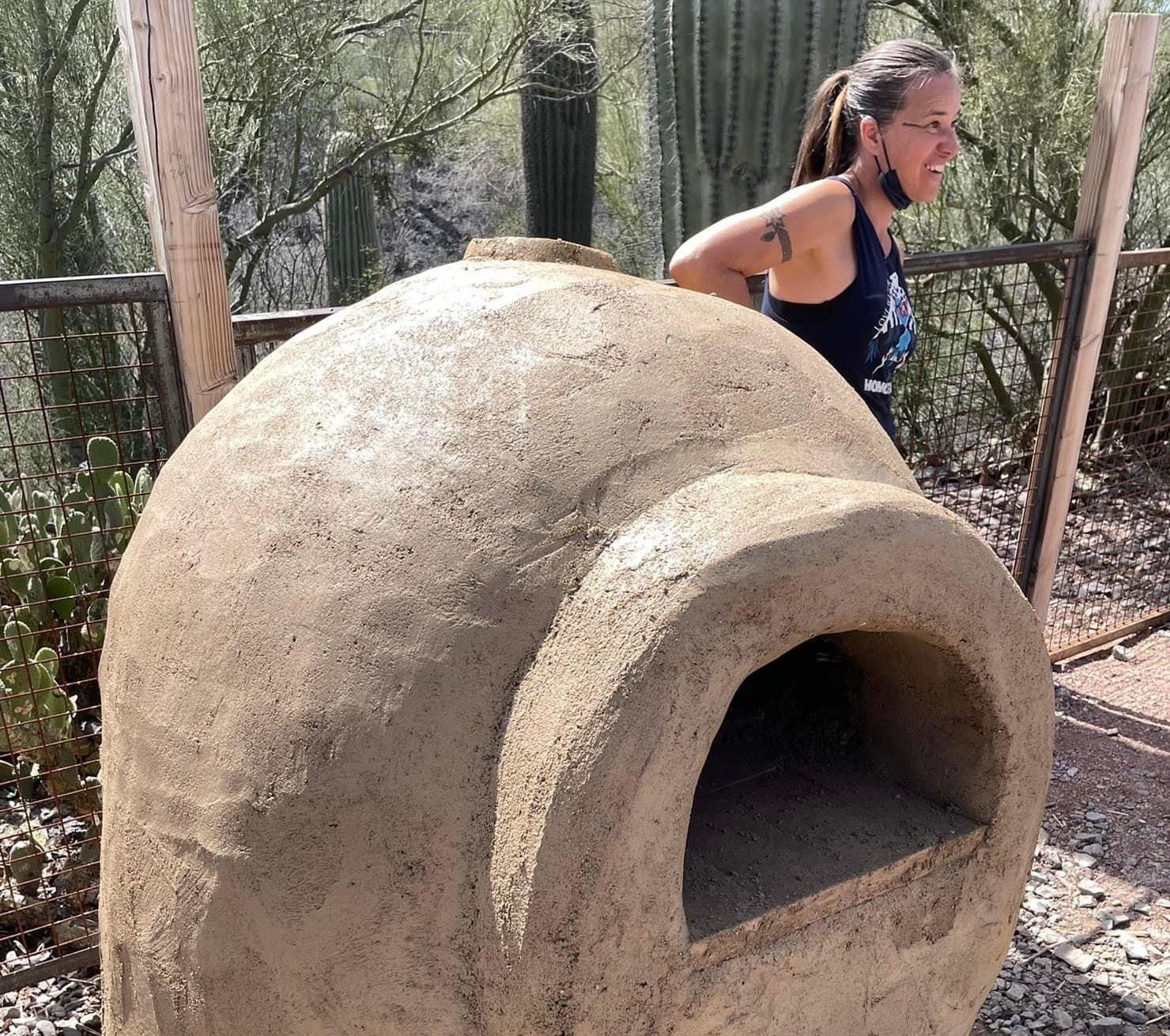
It Starts with a Seed: An Introduction to Tohono O'odham Farming: “The instructors were very knowledgeable and worked hard to bridge local/ community knowledge with information that might be useful to people who are gardeners or perhaps teachers in non-Indigenous spaces. For the co-op staff to open up their farm and to patiently share their stories and knowledge was incredible.”
Xinachtli ~ Ancestral Cooking and Storytelling: This class was exceptional. Chef Maria met us where we were in terms of education. She has a wonderful energy and shared freely. And the food her team prepared was delicious. I loved the art activity too.”
In October 2022, The College Social & Behavioral Sciences hosted the 10th anniversary of The Downtown Lecture Series at the historic Fox Theater. The 2022 Downtown Lecture Series focused on Sexualities, exploring the complex ways that gender and sexuality shape our lives, from the intimate to the institutional. Speakers for this year’s series addressed the cultural impacts of drag performance, 19th-century sex scandals, reproductive justice, and how gender and sexuality are taught (or not taught) in schools. Eric Plemons, associate professor in the School of Anthropology, studies the politics and practice of transgender medicine and was the curator of this year’s series.
21ST CENTURY DRAG: QUEER PLAY FROM SOCIAL MEDIA TO STORY HOUR


Harris Kornstein, assistant professor in the College of Humanities, discusses research into two of drag’s more recent frontiers: digital performances of identity via social media, and children’s story hours. Drawing on their own performance practice, Kornstein focuses on the ways drag disrupts binaries of truth and fiction, visibility and privacy, and pleasure and politics.
In Person Attendance: 110
Erika Pérez, associate professor in the Department of History, discusses her ongoing research on sex scandals and sex crimes in 19th-century California, focusing on a few specific legal cases and newspaper accounts to illustrate popular debates and societal anxiety about female sexuality, courtship, and the absence of patriarchal protection.
In Person Attendance: 84
Louise Marie Roth, professor in the School of Sociology, explores legal cases and birth trends that illustrate the implications of fetus-centered and womancentered approaches to pregnancy for evidence-based care during pregnancy, miscarriage, and birth. She argues that an emphasis on fetal personhood has the effect of negating personhood for fertile women.
In Person Attendance: 125
Carol Brochin, associate professor in the College of Education, will discusses the power of stories in transforming classrooms and communities. Drawing from theory and research, Brochin argues that we need schools that are not just inclusive for LGBTQ+ students but are sites of critical transformation where everyone can experience joy in learning about each other and their communities.
In Person Attendance: 105
All four lectures were live streamed and saved to the Downtown Lecture Series web page; each lecture has over 400 views to date.
The Justice, Equity, Diversity, and Inclusion (JEDI) Leadership Academy is a week-long, online program that immerses undergraduate students in pressing social justice issues on campus through an innovative teaching lens. For the inaugural year in 2021, the Academy focused on the theme of Mass Incarceration and subsequently in 2022, the topic of focus was Disability Justice.
2022 JEDI ACADEMY CURRICULUM INCLUDED:
• Diversity, Inclusion, and Access (on campus)
• Disability Rights and Solidarity
• Ableism 101
• Embracing Intersectionality and wholeness
• Social and Civic Action Strategies
JEDI ACADEMY LEARNING OBJECTIVES INCLUDED:
• Be introduced to social justice issues and how it applies to your life as a multi-faceted individual
• Participate in a safe space for critical discussion, thinking, and reflection for those exploring social justice advocacy as an undergraduate
• Meet like-minded individuals and be a part of a driven cohort of students
• Learn how to create accessible spaces as a student leader on campus
• Learn how to act in solidarity to social justice movements both on and off campus
• Begin to develop tools necessary to advocate for social justice on a broad scale
JEDI Academy Students were presented with these topics at hand by learning alongside those most impacted by ableism through experiential activities, such as workshops and small group discussions. Community engagement staff worked with community and university based experts to build our diverse and inclusive curriculum, reflective of the disabled community.
COMMUNITY PARTNERS INCLUDED:
• Diversity, Inclusion, and Access (on campus)
• Disability Rights and Solidarity

• Ableism 101
• Embracing Intersectionality and wholeness
• Social and Civic Action Strategies
UNIVERSITY OF ARIZONA PARTNERS INCLUDED:
• Disability Cultural Center director, staff and students
• Dev Bose, Associate Professor of Practice of English
28 students participated in the week-long academy. Priority applications were given to SBS students, and later opened up university wide. Special outreach efforts were developed with Thrive Center, New Start Program and the Cultural and Resource Centers.
"There was camaraderie in working with a team with the same goal for a good cause. I enjoyed getting to hear directly from those with disabilities. It was very eye opening and informative. I think it resonated more with me than just simple note taking would have."
"I really enjoyed this academy. Getting to learn about the topic was super insightful and it was great to hear the discussions and questions that others brought up."
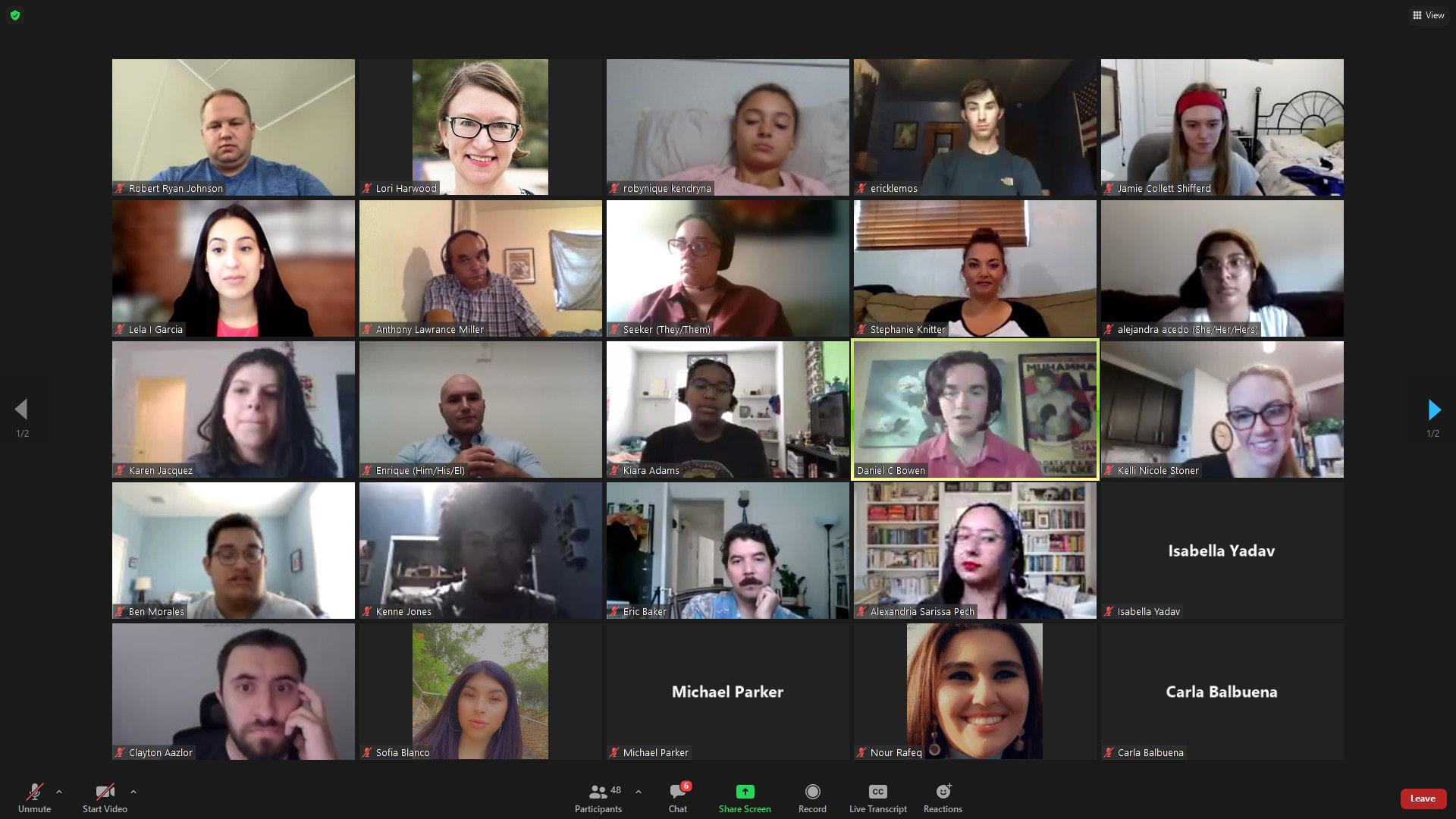
"It's a great resource to become more aware about others while learning about oneself."
"I thought that the guest speakers were very kind and accommodating. It's one thing to say "we need to adjust to fit people's needs" but they actually did that and made sure that our needs were being met in the learning environment. They all spoke clearly and from the heart which gives more sincerity to the subject we were learning about."
• The length, it could've been a bit longer and more hands-on.
• I think not just talking about the topic, but include more work like the last project we did with recourse and issue to fix.
• Make it a 3 unit course.
• I personally really hate zoom, just because it's not connected in real life.
Additionally, in September, we reconvened in-person for a recognition reception. Students were given the opportunity to reflect on their experiences, network and receive their Deans Badge of Engagement alongside Dean Lori Poloni-Staudinger.
SBS Community Engagement had the opportunity to create a new endowment fund in partnership with the UA Foundation and donors, Peter and Pat Hirschman. The Peter and Pat Hirschman Fund was established to build a grant for bringing the University of Arizona and community organizations together. The Fund was established to support awards for research collaborations led by the College of Social and Behavioral Sciences, or other schools, colleges and departments of The University of Arizona, in support of and in collaboration with community-based organizations in southern Arizona, including any non-profit and/or non-governmental organizations, and governmental (or quasi-governmental) sectors, with the purpose of advancing both understandings of, and solutions to, social justice-related issues facing the regional community. The fund's utmost priority is to provide grants for collaborations that hold promise for sustainable and measurable results in the community.
HIGHLIGHTS FROM THE HIRSCHMAN FUND’S INAUGURAL GRANT CYCLE: A committee of nine esteemed community and university members were convened to design the grant competition, review applications and ultimately make final award selection(s).

Stephanie Noriega, Assistant Director of Community Engagement, College of Social & Behavioral Sciences
Daniel Martinez, Associate Professor in the School of Sociology & co-director of the Binational Migration Institute in the Department of Mexican American Studies.
Elise Lopez, Director of the UA Consortium on Gender-Based Violence
Stacey Butler, Professor of Practice in the College of Law & Director, Innovation for Justice Program
Melanie Hingle, Professor in the School of Nutritional Sciences and Wellness
Nelda Ruiz, Programs Manager in Cultural Organizing, Southwest Folk Alliance
David Martinez III, Director of Capacity Building and Community Engagement, Vitalyst Foundation
John Fife, retired Presbyterian minister and co-founder of No More Deaths
Michael McDonald, Executive Director of Arizona Land and Water Trust
In January the inaugural grant cycle opened for applications campus/ community wide. The Hirschman Fund committee received a total of 8 applications and 1 was selected for full funding in the amount of $21,250. The committee reviewed a strong pool of community engaged research proposals, and are happy to announce the selected proposal went to the College of Agriculture, Life & Environmental Sciences (CALES). CALES will be working on a partnership based on the improvement of the existing Iskashitaa community garden. “This relationship is intended to address food insecurity and social isolation issues through community gardening and cross-cultural knowledge exchange.” - From the proposal abstract.
As a special project, SBS Community Engagement supported researchers behind the University Community-University Relations Report by broadcasting a webinar to share the research findings.
This study was sparked in 2018, when former SBS Associate Dean for Community Engagement Maribel Alvarez and Office of Social Impact Director Jennifer Fields participated in a series of campus conversations regarding how the university was engaging in and maintaining their respective community relationships. Despite COVID-19 setbacks throughout 2020/21 the study was completed by Director of the School of Anthropology Diane Austin and her team of researchers. The study has provided critical findings that will continue to serve as a blueprint to authentic community engagement.
“The study is the *first* of its kind in university history. It was commissioned by the Dean’s Office of SBS, supported with funds from Research, Innovation and Impact, and conducted by the Bureau of Applied Research in Anthropology."
"The study is essential for the university application to receive the Carnegie designation as a “community engaged university.” This application is important to our senior leaders and we are contributing a critical piece --- the self-critical assessment of our work and its impact. However, we commissioned the study before the Carnegie application was in sight. I am deeply proud of this work ---- a true SBS point of pride ----and could not have entrusted it to anyone better than BARA – Diane Austin and her grad students did an exceptional job. The study captures authentically the good, the bad, and the questioning of University-led interventions in communities.” -
Maribel AlvarezSince the dissemination of the findings via the written report and the webinar in Spring 2023, several groups have reached out to discuss and share ideas for further application of this research.